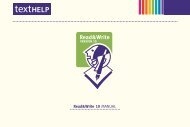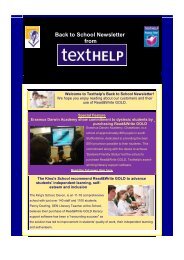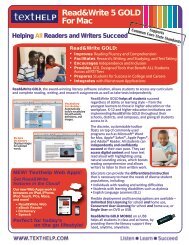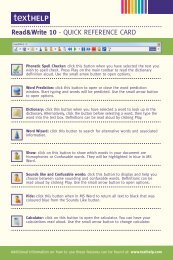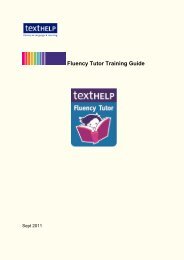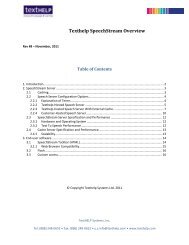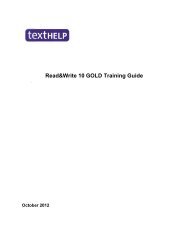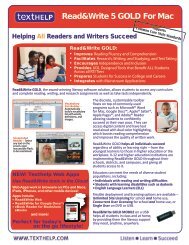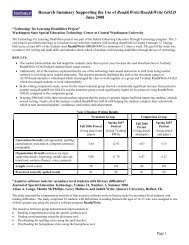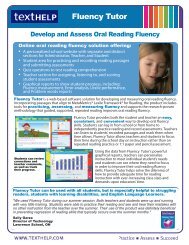01 NRDC Dyslexia 1-88 update - Texthelp
01 NRDC Dyslexia 1-88 update - Texthelp
01 NRDC Dyslexia 1-88 update - Texthelp
Create successful ePaper yourself
Turn your PDF publications into a flip-book with our unique Google optimized e-Paper software.
16<br />
Research Report<br />
reading disability lies in the effectiveness of the instruction received rather than the<br />
categorisation of reader type’ (Pogorzelski & Wheldall, 2002). While there might be valid<br />
distinctions between dyslexic and ordinary poor readers in theory, ‘there are few compelling<br />
reasons for attempting to make such distinctions in practice’ (Fowler & Scarborough, 1993),<br />
since emphasis on a phonics-based curriculum and multisensory methods may benefit all<br />
poor readers, not dyslexics alone (Davis & Cashdan, 1963).<br />
There are many reasons why students in basic skills classes have low reading skills and there<br />
are many possible outcomes for education programmes that address their problems (Brooks<br />
et al., 20<strong>01</strong>b; Sheehan-Holt & Smith, 2000; Strucker, 1995). For intervention programmes, an<br />
appropriate guiding principle may be assimilation (Fowler & Scarborough, 1993), namely, the<br />
avoidance of any attempt to separate dyslexic and ‘ordinary’ adult learners with reading<br />
difficulties. However, tutors need to bear in mind that the over-diagnosis of dyslexia might<br />
neglect other types of special educational need (Thomson, 2002). By contrast with<br />
intervention, the guiding principle in scientific research is not assimilation but differentiation.<br />
Between research and practice there is no exact alignment, neither should we seek one:<br />
‘models of etiology and models of treatment bear no necessary relation to one another’<br />
(Sroufe, 1997).<br />
We shall explore the implications of this observation in the following section. Meanwhile, we<br />
note that:<br />
■<br />
■<br />
■<br />
■<br />
■<br />
■<br />
■<br />
■<br />
Scholars agree that difficulty in learning to read can have many causes.<br />
They agree that some causes of reading difficulty are located within society.<br />
They agree that some causes of reading difficulty are located within the individual.<br />
Scholars do not agree as to the relative importance of those causes.<br />
They do not agree as to whether dyslexia is a valid concept.<br />
Among the scholars who believe that dyslexia is a valid concept, there is no agreement as to<br />
precisely what it is, or whether it is subsumed by or distinct from ordinary poor reading.<br />
Scholars do not agree as to whether dyslexic and non-dyslexic poor readers require different<br />
intervention programmes.<br />
Scholars who believe that dyslexic people require different interventions from those needed<br />
by ‘ordinary’ adult learners with reading difficulties do not agree about the nature of those<br />
interventions.<br />
Conceptual issues<br />
The context<br />
<strong>Dyslexia</strong> is associated with problems of great complexity. These problems are fundamental;<br />
they cannot be dismissed as semantic quibbles. It may be helpful to begin by asking a few<br />
elementary questions, in order to outline possible ways in which they might be answered. By<br />
looking at different uses of the word ‘dyslexia’ and by asking which, if any, of these uses might<br />
be currently supported by scientific evidence, we will be brought face-to-face with some of the<br />
conceptual problems. After that, we can go on to consider the practical difficulties that follow<br />
from the conceptual problems.<br />
In many other fields of enquiry, there is a consistency in the use of words that makes this<br />
strategy unnecessary. In dyslexia research and practice, there is a degree of inconsistency<br />
verging on anarchy, as the opening paragraphs of the introduction reveal (and as Appendix 1<br />
illustrates).



